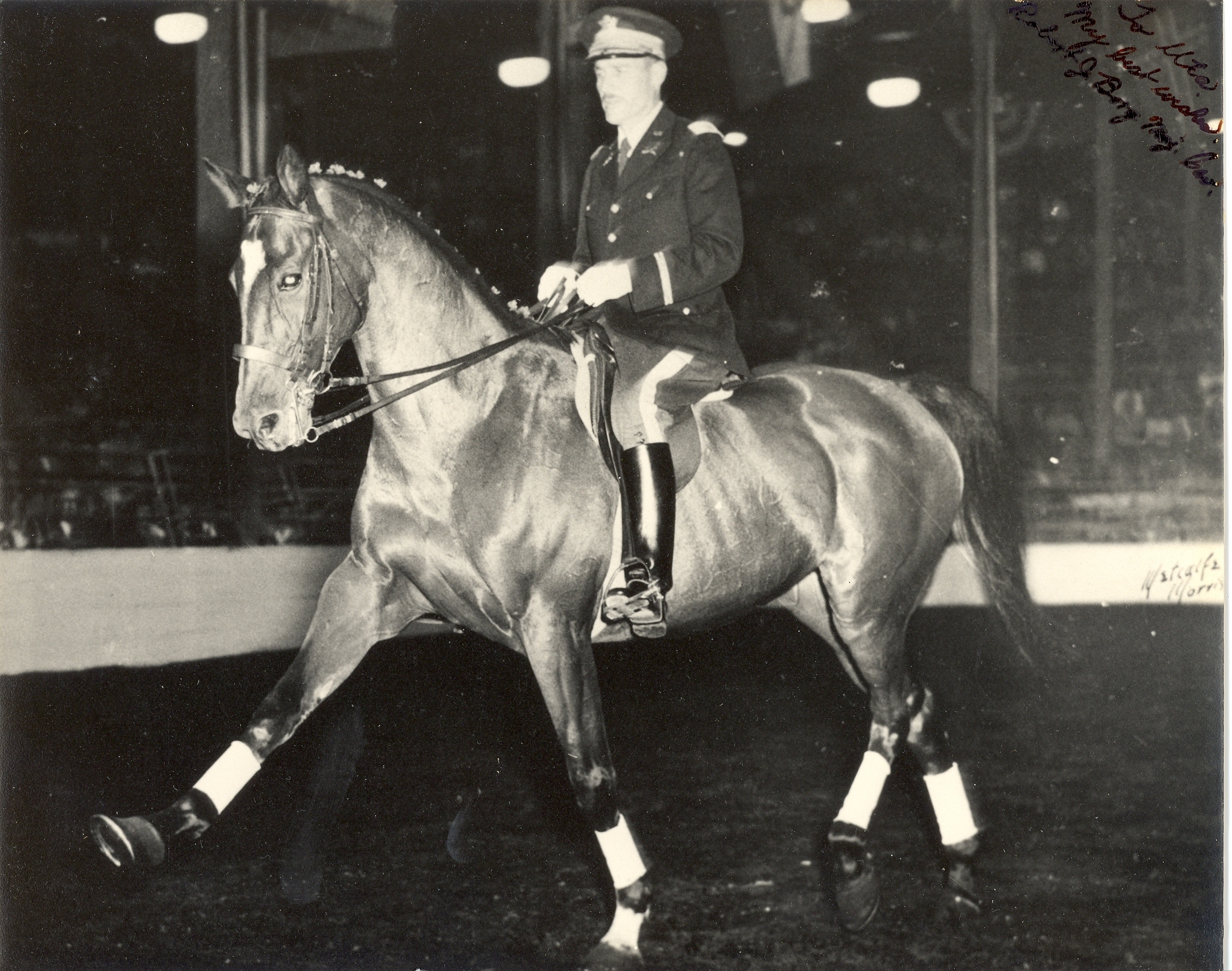Major Borg is synonymous with the origins of dressage in the United States. His competitive accomplishments are legendary. He coached the U.S. dressage and event horses and riders in the 1948 Olympics in London, and he rode in the dressage as well. This was the last Olympics in which our riders were members of the military. He repeated this feat at the 1952 Games in Helsinki and the 1956 Games in Stockholm. His U.S. Dressage Team won the silver medal in the 1948 Olympics-still the highest placing of a U.S. Team in dressage. Major Borg also placed fourth individually in this Olympics. He is the only person in history who has coached and ridden on the same Olympic Team. He also coached the Gold Medal winning U.S. Eventing Team at the 1948 Olympics. Read more
Major Borg earned many other honors. He won the individual silver medal at Grand Prix riding Bill Biddle at the 1955 Pan American Games. In 1995, The Chronicle of the Horse named Bill Biddle to its Equine Hall of Fame. In 1999, Major Borg was one of the inaugural recipients of the AHSA Pegasus Medal of Honor.
President Harry Truman invited him to ride in an exhibition at the Sheriff's Posse Horse Show in Missouri. He accepted a trophy from President Truman commemorating the disbanding of the U.S. Cavalry. He was the last enlisted man to be inducted into the cavalry. Major Borg also rode for the inauguration for the Mexican President in 1953.
Overshadowing the significant recognition gained by his Olympic success was the inspiration he brought to all who studied dressage with him following a crippling accident in 1959. Talk about personal courage and determination! You cannot help but be touched by a man who does not look to others for help when things go wrong, or wait for them to fix everything and make it all right. This man looked within, and literally began to rebuild his life. He looked adversity in the face and might have said in a calm, certain inner voice, "You are not going to get the best of me."
Though physically disabled, Major Borg's wit remained sharp, and he was determined to continue to train. After many attempts to ride or drive horses, he devised a wooden box much like the driver's area of a chariot, on a wheel hub that he could be strapped into so that he could continue his work with the horses. This invention, which was soon dubbed, "the round table," pivoted 360 degrees in either direction, stopped by the firm placement of his cane. The roundtable served as the center of his lunging circle. Some of the horses developed on this table were trained to the FEI levels, and were successfully shown by his long-time friend, Helga Duffy. Whenever a race horse became unmanageable, the racing personnel would send it to this astonishing paraplegic to be made tractable. The greater parts of these horses were taught to work steadily around this little five meter circle, including movement at piaffe and passage. It could be counted on that the horses would win in their next race.
His own life was the highest teaching example to which one could aspire. By instilling kindness with a will that is calm, yet inflexible, he brought out the best qualities of the horses and riders that crossed his extraordinary path. His indomitable will, strength, and courage enabled him to provide expert training to more than 600 horses over 45 years at his Thoroughbred Red Bob Farm in Oxford, Michigan. He took the raw material that presented itself to him, whether human or equine, and brought out the best that was in it. His students included Sandra Elwood and Roemer Foundation/USDF Hall of Fame members, Chuck Grant and Violet Hopkins. Elwood, a Grand Prix rider, said, "What Major Borg has done and taught has changed lives for horses and people, brought the rider and horse back together as a whole, instead of two separate entities."
After his tragic accident, dressage shows with Major Borg were like attending the Oscars. Professionals, show management, technical delegates, and anyone who knew who he was flocked to him to seek advice on their latest difficulty. They knew he would give correct guidance.
Major Borg was one of the fathers of dressage in the United States, excelled as an international coach, trainer, and competitive rider, and demonstrated incredible strength, courage, and determination to continue his career after his tragic accident. I am honored to induct Major Robert Borg into the Roemer Foundation/ USDF Hall of Fame.
Sammuel J. Barish
USDF President
 In recognition of his outstanding dressage riding, training, and coaching from grass roots to Olympic levels. Major Borg coached and rode on the U.S. dressage team in three Olympic Games, earning a team silver medal and placing fourth individually. After a paralyzing riding accident, his indomitable will, strength, and courage enabled him to provide expert training to more than 600 horses for over 45 years at Red Bob Farm in Oxford, MI.
In recognition of his outstanding dressage riding, training, and coaching from grass roots to Olympic levels. Major Borg coached and rode on the U.S. dressage team in three Olympic Games, earning a team silver medal and placing fourth individually. After a paralyzing riding accident, his indomitable will, strength, and courage enabled him to provide expert training to more than 600 horses for over 45 years at Red Bob Farm in Oxford, MI.